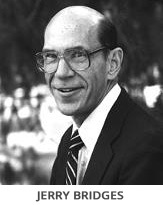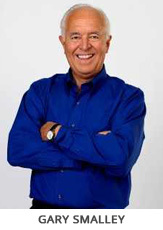Randy Alcorn's Blog, page 152
March 9, 2016
Jerry Bridges and Gary Smalley: Very Different Personalities Go Home to the Same King

Two brothers, Jerry Bridges and Gary Smalley, went to Jesus last Sunday, March 6. I knew and loved them both. Their personalities were—and I assume still are—radically different. But both loved and served their King, and now do so more than ever.
Jerry and Gary, in unique but complementary ways, left a heritage of faith many of us have benefited from.
Jerry taught so many of us how to keep on trusting God in the pursuit of holiness through decades of faithful ministry amid cancer and loss. His most well-known book may be The Pursuit of Holiness, but one of my favorites of his, which I recently endorsed in its re-release, is The Joy of Fearing God. Timeless books of biblical theology made practical. They will never get old.
 Two of Gary’s more popular books are The Blessing and If Only He Knew. Gary, with his effusive personality, was a far more public figure, appearing on Oprah and countless other programs, including an infomercial with Dick Clark, while Jerry, serious and soft-spoken, made his appearances in more theologically-based conferences, such as Desiring God and The Gospel Coalition. Talks with Gary often got me laughing; talks with Jerry always got me thinking. And don’t we all need to both laugh and think more?
Two of Gary’s more popular books are The Blessing and If Only He Knew. Gary, with his effusive personality, was a far more public figure, appearing on Oprah and countless other programs, including an infomercial with Dick Clark, while Jerry, serious and soft-spoken, made his appearances in more theologically-based conferences, such as Desiring God and The Gospel Coalition. Talks with Gary often got me laughing; talks with Jerry always got me thinking. And don’t we all need to both laugh and think more?
Nanci and I loved getting to know Jerry and his wife Jane at the 2007 Desiring God Conference, where we both spoke. I had met and talked with Jerry years before, but that was the first time I’d had extended conversations with him over meals, and experienced the quality of his life up close.
I quoted what Jerry wrote in Is God Really in Control? in my book If God Is Good:
If God is truly sovereign, if He truly loves you, and the teaching of Scripture is correct, then God will never allow any action against you that is not in accord with His ultimate purpose to work for your good. If the evil done against you is fresh and haunting, then I know my words may seem terribly calloused. But I say them because I believe they are true. Scripture teaches them, and one day we will all believe them, when we are with Him.
Both Jerry and Gary served Jesus in their own inimitable ways. While I’m saddened at their parting, I rejoice that they are with Him now, thinking and laughing better than ever. I believe among the words spoken by our Savior to these brothers a few days ago were, “Well done, my good and faithful servant. Come and share your Master’s happiness” (Matthew 25:23).
I look forward to thinking and laughing with these brothers again, in the presence of our Savior and King.
Randy Alcorn
You might also like to read:
A warm tribute to Gary Smalley by Jim Daly, president of Focus on the Family.
A wonderful tribute to Jerry Bridges by Tim Challies.
A great Tony Reinke interview with Jerry Bridges.
March 7, 2016
Using Romans 1 to Test Other Worldviews

I’ve written before about the astounding number of college students who are abandoning their faith in Christ. It’s vital that parents and church leaders understand some of the major reasons behind this trend and know what they can do now to help their children prepare for the challenges ahead.
This post from Nancy Pearcey on the Desiring God blog provides a great way for Christian young people (and all of us) to answer other worldviews they’ll encounter on college campuses and beyond:
One Strategy to Rule Them All: How to Answer Skeptics from Romans 1
In high school, Dylan was a natural leader, voted Most Valuable Player on his football team. Everyone expected him to succeed. But when he went to college, Dylan’s Christian convictions were assailed by doubts in virtually every class.
In his science classes, Darwinian naturalism was an unquestioned assumption. In English class, a postmodern attitude treated all truth claims as disguised power plays. In psychology, the prevailing theories — from Freud’s psychoanalysis to Skinner’s behaviorism — treated Christianity as a symptom of mental pathology.
Dylan’s church had taught the basic gospel message, but it had not equipped him to meet the challenges of the university classroom. Deeply shaken, he dropped out of college and began to rethink whether Christianity was even true. Dylan eventually found his way to L’Abri, the ministry of Francis Schaeffer in Switzerland. There he finally met Christians who could teach him to “destroy arguments and every lofty opinion raised against the knowledge of God” (2 Corinthians 10:5).
How can the church be more effective in equipping young people to keep the faith when they leave home?
photo by Ryan Tauss via Unsplash
March 4, 2016
An Idea for Churches, Families and Individuals: Let’s Celebrate the International Day of Happiness!

It’s likely not marked on your calendar, and you’ve probably never heard of it—but Sunday, March 20 is the International Day of Happiness. (And no, it wasn’t invented by Hallmark!)
The day was started in 2012 when all 193 United Nations member states adopted a resolution calling for happiness to be given greater priority. Not only is happiness a worldwide concept, but the English word happiness is one of the most familiar and desirable ones on the planet. The synonyms for happiness in any language are on the short-list of the most popular and appealing terms.
As I researched my book Happiness, I first heard of this, and began to wonder: what would it look like if evangelical churches led the way in annually participating in the International Day of Happiness, by celebrating the good news of happiness that Isaiah 52:7 talks about?
How beautiful upon the mountains are the feet of him who brings good news, who publishes peace, who brings good news of happiness, who publishes salvation, who says to Zion, “Your God reigns.”
Both the NASB and the ESV, two of the most literal translations, render the Hebrew here as “good news of happiness.” The immediate context of Isaiah 52-53 is messianic, and this good news of happiness is exactly the same “good news of great joy” the angel spoke of to the shepherds after the birth of Jesus (Luke 2:10).
What an opportunity the International Day of Happiness could be to tell each other and the world about the happiness of God and the happiness Christ came to bring to all the nations! Wouldn’t it be refreshing for Christians to make positive remarks about happiness and direct people toward the happy God they desperately need to know? (I’m not talking about contrived happiness as a pretense or strategy for church growth, but the genuine happiness that naturally flows from God and the gospel.)
I think such celebrations would make a powerful statement that we value true God-honoring and Christ-exalting happiness, and so does God, who went to great lengths to secure our eternal happiness in Him.
And imagine the potential for changing the popular image of the church. How much different it would be if people looked less at the church as a group of always critical, always complaining, always feeling persecuted bunch of curmudgeons!
Instead of backing away from happiness or trying to correct those who love the word happiness (which almost everyone does, except some inside the church), we should embrace it, realizing that Jesus is inseparable from true and ultimate happiness.
 If only today’s church could grasp what God’s people have always known and, instead of fighting happiness, embrace it as a partner in preaching the good news of great joy.
If only today’s church could grasp what God’s people have always known and, instead of fighting happiness, embrace it as a partner in preaching the good news of great joy.
Paul expressed his astonishment that the Galatian Christians were “turning to a different gospel—not that there is another one” (Galatians 1:6-7). The phrasing is significant—he was saying they distorted the gospel and it was therefore no longer the gospel at all. Their gospel was human centered and burdensome and misery making, not Christ centered and freedom giving and happy making. A gospel not dominated start to finish with the grace of Jesus is an unhappy gospel. And there’s no such thing, since gospel means “good news.”
The Pharisees twisted biblical truth to make their own system of rules and regulations. They were quick to criticize and condemn, and looked like they’d been sucking lemons all day. They were the Bible-believing conservatives of their day, but they drained the joy out of belief in God, and failed to live in the celebratory mood of the great feasts and parties that are spoken of throughout the Old Testament. They condemned Jesus as a drunk and a glutton because He went to parties that were fun and entertaining.
Do we really wish to distance the gospel and church from happiness? If we succeed, we’ll inevitably distance them from both our children and the world, for everyone will go right on wanting happiness. Christians shouldn’t abandon happiness—we should embrace happiness, the true happiness Scripture freely offers through God’s persistent and everlasting love:
But let all who take refuge in you rejoice;
let them ever sing for joy,
and spread your protection over them,
that those who love your name may exult in you.
For you bless the righteous, O Lord;
you cover him with favor as with a shield. (Psalm 5:11-12, emphasis added)
 So, what might celebrating the International Day of Happiness look like in your church? Perhaps it would mean putting on a party or a carnival, and inviting the local community. Think of the refreshment that weary, burdened, guilt-ridden people would enjoy if your church put on a celebration of biblical proportions, with great food and drink and music and laughter and fun, just to say, “We love you, Lord Jesus, and we love this community, and we’re here to celebrate the gift of happiness that comes from you!”
So, what might celebrating the International Day of Happiness look like in your church? Perhaps it would mean putting on a party or a carnival, and inviting the local community. Think of the refreshment that weary, burdened, guilt-ridden people would enjoy if your church put on a celebration of biblical proportions, with great food and drink and music and laughter and fun, just to say, “We love you, Lord Jesus, and we love this community, and we’re here to celebrate the gift of happiness that comes from you!”
Such a celebration could provide the opportunity to share the truth that as sinners in rebellion against the happy God who made us, we’re separated from happiness because we’re separated from its source. But the staggeringly good news is that by trusting Christ’s redemptive work for us, we can enter into a relationship with God. In doing so, we can enter into what we long for: the happiness found only in God.
Since March 20 is right around the corner, if your church isn’t able to pull together a formal celebration this year, you can put it on the calendar for 2017 and start to make plans now. And as individuals, we certainly can open our homes through hospitality and our lives through service on March 20, in order to share Christ’s love and happiness with those in our neighborhoods and communities. (Incidentally, this year March 20 is also Palm Sunday.)
 And while we’re at it, what about celebrating October 4, “Saint Francis of Assisi Day,” with churches inviting the community to celebrate animals in a way that’s God honoring? Don’t let PETA and others with a naturalistic worldview put an exclusive claim on valuing animals. God values them and so should we! People love their pets, and churches could open their grounds and invite people to bring their pets (okay, maybe you could start with dogs then figure out the logistics for cats, rabbits, gerbils, and reptiles in future years).
And while we’re at it, what about celebrating October 4, “Saint Francis of Assisi Day,” with churches inviting the community to celebrate animals in a way that’s God honoring? Don’t let PETA and others with a naturalistic worldview put an exclusive claim on valuing animals. God values them and so should we! People love their pets, and churches could open their grounds and invite people to bring their pets (okay, maybe you could start with dogs then figure out the logistics for cats, rabbits, gerbils, and reptiles in future years).
This could be a fun, joyful and powerful outreach to people who otherwise would never connect with a church. Surely, regardless of our varying political persuasions, Christians should agree that the God who created the world and placed it under our management expects us to show gratitude and respect for the animals He entrusted to our care in Genesis 1-2.
Wouldn’t it be great if children growing up in Christian homes looked forward to additional God-centered holidays—ones they could invite their unbelieving friends to join? Wouldn’t it be fitting if church was known as the place that celebrates more than the world, rather than less? Worship, camaraderie, and unity would be hallmarks of such events. But one of the greatest payoffs would be reestablishing followers of Jesus as people of profound happiness who are quick to celebrate the greatness, goodness, love, grace, and happiness of our God.
God’s people ought to say, “Let us eat, drink, and be merry to celebrate the time when we’ll eat, drink, and be merry in a world without suffering and without end!”
Were we to do more of this kind of celebrating, and do it better, surely fewer of our children, and the next generation, would fall for the enemy’s deadly lie—that the gospel of Jesus doesn’t offer happiness and that people must go elsewhere to find it.
I love what theologian Robert Hotchkins wrote: “Christians ought to be celebrating constantly. We ought to be preoccupied with parties, banquets, feasts, and merriment. We ought to give ourselves over to celebrations of joy because we have been liberated from the fear of life and the fear of death. We ought to attract people to the church quite literally by the sheer pleasure there is in being a Christian.”[i]
May the righteous be glad and rejoice before God; may they be happy and joyful. (Psalm 68:3, NIV)
[i] Robert Hotchkins, as quoted in Philip Graham Ryken, Jeremiah and Lamentations: From Sorrow to Hope (Wheaton, IL: Crossway, 2001), 271.
Cupcakes photo credit: Sheelah Brennan / Dog photo credit: Nomao Saeki, both via Unsplash
March 2, 2016
How God Can Use Even a Simple Booklet
 Someone on Facebook shared this picture with me a few months back of a young reader checking out my Heaven booklet. (If you read it right side up, it might have even more impact!)
Someone on Facebook shared this picture with me a few months back of a young reader checking out my Heaven booklet. (If you read it right side up, it might have even more impact!)
I’ve been greatly encouraged by the responses to this little 60-page booklet, which contains a sampling of the questions and answers found in my Heaven book. Heaven has reached one million copies sold, and this small, affordable booklet has sold over 1,200,000. I never would have guessed it of either!
We’ve heard from many readers about how they’re using the booklets evangelistically. An EPM reader sent this story from a physician friend:
We make the Heaven booklet available to all of our patients who might wish to take one. A lady just told me that her father had come with her to her office visit about 6 months ago. While he was waiting in the office, he picked up one of the booklets and read it cover to cover. He reportedly was a scientist and somewhat agnostic. Because he saw these booklets in a "smart doctor's office" he read the booklet and over the next couple of months, had some other interactions with questions. He died in December, but two weeks before his death he accepted the Lord. His daughter was in the office in tears today thankful for that booklet.
Another reader wrote, “The booklet versions of Heaven and If God Is Good have become standard usage for me when engaging in grief counseling with both those who are dying and those who have lost a loved one. While I occasionally give the full versions away, the mini ones are so convenient—people who are grieving are intrigued by their titles and appreciate the shorter read during all of the busyness that dealing with a death can bring.”
One of the most distinctive aspects of how the Heaven booklet has been used is its wide distribution at memorial services. Some churches, including my own, make it available at every memorial service. Sometimes it’s handed out at the door; sometimes it’s placed on the seats or pews. When the person’s death was tragic and troubling, my booklet If God Is Good: Why Do We Hurt? is used. Unbelievers and believers alike struggle with the problem of evil and suffering. As I do in the Heaven booklet, in If God Is Good, I share the good news of salvation in Christ.
Last year, a new beautiful little book called God’s Promise of Happiness was released, which is a simplified and differently presented version of the big Happiness book. It’s designed for believers who want an introduction to the topic, but don’t have the time or inclination to engage the larger work. God’s Promise of Happiness is also written for unbelievers who are interested in the subject and will be drawn to the Gospel as “good news of happiness” (Isaiah 52:7, ESV). I believe its pocket size and the question and answer format will make it a helpful tool in sharing the Gospel of Christ. In that sense, it’s sort of the happiness equivalent of my Heaven booklet.
Many people, including myself, regularly give away booklets. It doesn’t take much effort, and when it does, it’s more than worth it. I leave them with servers at restaurants (always with a tip that's 20% or more), give them to people on planes, and have them on me for checkers at stores. In some cases, we won’t be in a position to follow up and may not see the person again in this life. But consider that one day, in the presence of Christ, you may have a person who read the booklet and came to faith in Christ, or were strengthened in their faith, say to you, “Thank you for giving me that booklet—God used it powerfully in my life!”
What a privilege!

All of the single copies of Randy Alcorn’s booklets (God’s Promise of Happiness, Heaven Booklet: Biblical Answers to Common Questions, and If God Is Good: Why Do We Hurt?) are on sale from EPM for $1 each, plus shipping and handling. (Save up to 50% off retail prices.) Sale ends Tuesday, March 8 at 4 P.M. PT.
February 29, 2016
Managers of Creation

In Genesis 1 and 2, we see that in giving management of creation to Adam and Eve, God appointed human beings to rule the earth. All people would be their descendants, taking up their management responsibilities in turn:
“Then God said, ‘Let Us make man in Our image, according to Our likeness; let them have dominion over the fish of the sea, over the birds of the air, and over the cattle, over all the earth and over every creeping thing that creeps on the earth.’ So God created man in His own image; in the image of God He created him; male and female He created them. Then God blessed them, and God said to them, ‘Be fruitful and multiply; fill the earth and subdue it; have dominion over the fish of the sea, over the birds of the air, and over every living thing that moves on the earth’” (Genesis 1:26-28, NKJV).
God’s intention for humans was that we would occupy the whole Earth and reign over it, to God’s glory. This reigning, expanding, culture-enriching purpose of God for mankind on Earth was never revoked or abandoned. It has only been interrupted and twisted by the Fall. But neither Satan nor sin is able to thwart God’s purposes. Christ’s redemptive work will ultimately restore, enhance, and expand God’s original plan.
I share more in this video (kindly animated by the staff at Clarion Creative):
Heaven ExplainED: Managers of Creation from Randy Alcorn on Vimeo.
Photo credit: NASA via Unsplash
February 26, 2016
Ten Suggestions to Help You Relax Through Sleep
 A godly Bible teacher was asked what helped him most to walk in the Spirit. Of course, he studied God’s Word and met with the Lord daily. But his surprising reply to the question was this: “Getting eight hours of sleep each night.”
A godly Bible teacher was asked what helped him most to walk in the Spirit. Of course, he studied God’s Word and met with the Lord daily. But his surprising reply to the question was this: “Getting eight hours of sleep each night.”
Sleep does indeed have a profound effect on every aspect of our being—physical, mental, emotional, and even spiritual. Sleep is the body’s most basic and extensive attempt at relaxation and renewal. Stress often causes a lack of good sleep. Ironically, a lack of good sleep will inevitably cause stress.
It’s easy to stay up late tonight, but tomorrow we, and those around us, will pay the price in the form of fatigue and irritability. Often the key to the quality with which we experience today is what we did last night and how late we did it. Put two or three busy nights with six hours of sleep together and we’re deep in debt, trying to spend energy we don’t have.
It’s a simple matter of mathematics. If I need eight hours of sleep and I must get up at 6:30 in the morning, then I need to be asleep at 10:30. Not heading for bed at 10:30, but asleep at 10:30, which probably means I should try to be in bed by 10:00.
But for many, Insomnia can be maddening. Here are a number of suggestions that Nanci and I and others have found helpful—perhaps you will, too.
1. Get a good mattress. We will spend one-third of our lives in bed. Isn’t it worth having a good one? Especially since the quality of that one-third will dramatically affect the other two-thirds. Many of us sleep better in a larger bed.
2. Watch the room temperature and the ventilation. Too hot or too cold means sleeplessness or restless sleep. Adding or subtracting covers or adjusting an electric blanket may be enough to make the difference.
Some people need fresh air to sleep, so they crack the window even in winter. Try it. If the air is too dry for you, get a humidifier.
3. Minimize distractions. Do street lights and traffic noise disturb you? Perhaps you can move into a bedroom at another end of the house. Try blackout shades to keep out light. I regularly sleep with earplugs, and have a sleeping mask beside the bed to cover my eyes in early morning.
4. Relax before you get into bed. Many poor sleepers instinctively tighten up when they get into bed, ready for the big fight for sleep, which they invariably lose. Instead of trying to relax once in bed, relax before you get there. Take a walk—get some fresh air. Take a warm bath to reduce your tension. Drink warm milk—it contains a natural tranquilizer.
5. Avoid chemical stimulants before going to bed. Avoid caffeine within five hours and chocolate or sugar of any kind within three hours of retiring.
6. Eat an early dinner, moderately sized. If you eat a large dinner or a late dinner or a big snack at 8 p.m., your body is still trying to digest it when you go to bed. You can’t give your body a chore to do, then expect it to sleep at the same time! On the other hand, if you eat like a bird you may be unable to sleep because of hunger pangs.
7. Avoid working on problems and reading or watching distressing things late at night. Don’t try to balance your checkbook or do anything that requires deep thought late at night; it just causes frustration and leads to sleeplessness.
A few years ago I was at the beach by myself for ten days of writing. Each night I slept soundly and woke up refreshed—except one night when I was fitful and restless, and woke up exhausted. That one night was the only one I had watched the eleven o’clock news.
The best cure for insomnia may be to avoid the late news. It invariably features murders, hijackings, kidnappings, wars, and natural disasters. Just thinking of these things will tighten you up. The same is true of watching violent or tense movies, or reading about distressing events in the newspaper just before going to bed. Your last dominant thoughts before the lights go out set the mood for your night’s sleep. If you want good sleep, make sure you close the day with good thoughts, such as words from Scripture.
8. Develop a bedtime ritual. We are creatures of habit. If we can associate sleep with a certain routine, then going through the routine can help induce sleep. A bedtime ritual might involve a warm bath, a cup of warm milk, soft music, or light reading. Some people read till they begin to nod off then turn off the light and go right to sleep.
9. If you just can’t get an idea or problem off your mind, get up and do something about it. Sometimes we really need to get something off our minds. Keep paper and pen (and perhaps a little light) by your bed to jot down anything you might need to think about tomorrow, but don’t need to do tonight.
10. Learn when to nap and when not to. There are two kinds of fatigue. Hypertonic fatigue is the nervous stress-induced fatigue in which you are tired but unable to relax. Hypotonic fatigue results from hard physical labor. The muscles are relaxed and the mind drifts quickly into sleep. If you experience hypertonic fatigue during the day, the best cure is exercise, not a nap. If you take a nap, it might not refresh you, but even if it does it will usually make it more difficult for you to sleep at night. (Sometimes this creates a vicious cycle in which you nap in the afternoon because you can’t sleep at night, but can’t sleep at night because you napped in the afternoon.)
If you’re fatigued, and especially if you have a big evening ahead of you, by all means, nap if you can. For most people, a short nap of no more than 20 minutes works best.
In his article “Three Reasons to Get Some Sleep,” Jonathan Parnell writes, “Just like oxygen and food, we need sleep to work right. It won’t look the same for everyone, and some are in situations where their care for others inhibits a solid snooze, but know for sure that we need sleep. It was God’s idea.”
Parts of this blog were excerpted from Help for Women Under Stress.
Photo credit: Cheryl Winn-Boujnida via Unsplash
February 24, 2016
Preaching Directly and Seasonably: Thoughts from Rev. John Kennedy

I love these comments on preaching. The author, Reverend John Kennedy, was speaking of the preachers of Ross-shire who were not like those described at the beginning of each paragraph, but like those described at the end. I’ve left out his specific references to those particular preachers, because I think it helps us who are unfamiliar with them to be able to make a timeless application today.
“There are some who preach before their people, like actors on the stage, to display themselves and to please their audience. Not such were the self-denied preachers…
There are others who preach over their people. Studying for the highest, instead of doing so for the lowest, in intelligence, they elaborate learned treatises, which float like mist, when delivered, over the heads of their hearers. Not such were the earnest preachers.…
There are some who preach past their people. Directing their praise or their censure to intangible abstractions, they never take aim at the views and the conduct of the individuals before them. They step carefully aside, lest their hearers should be struck by their shafts, and aim them at phantoms beyond them. Not such were the faithful preachers…
There are others who preach at their people, serving out in a sermon the gossip of the week, and seemingly possessed with the idea that the transgressor can be scolded out of the ways of iniquity. Not such were the wise preachers…
There are some who preach towards their people. They aim well, but they are weak. Their eye is along the arrow towards the hearts of their hearers, but their arm is too feeble for sending it on to the mark. Superficial in their experience and in their knowledge, they reach not the cases of God’s people by their doctrine, and they strike with no vigor at the consciences of the ungodly. Not such were the powerful preachers…
There are others still who preach along their congregation. Instead of standing with their bow in front of the ranks, these archers take aim in line and, reducing their mark to an individual, never change the direction of their aim. Not such were the discriminating preachers…
But there are a few who preach to the people directly and seasonably the mind of God in His Word with authority, unction, wisdom, fervor and love …”
Revd. John Kennedy, The Days of the Fathers in Ross-shire (Inverness, 1895), pages 22-23.
(Originally on Ray Ortlund’s blog)
photo credit: Freeimages
February 22, 2016
Turning from Idols to Find True Happiness in God

In the first chapters of Genesis, God had no competition for the affection of His creatures. Humanity found its meaning, purpose, and happiness in God. God was God; everything else wasn’t. And everyone knew it. The fall tragically changed that.
We turned from God, the one true source of happiness, to false gods of every imaginable description. False gods are anything we praise, celebrate, fixate on, and look to for help that’s not the true God. One term describes and unites them all—idols. To grasp a biblical theology of happiness, we must understand the nature and extent of our constant temptations toward idolatry.
Because we all sinned in Adam (see Rom. 5:12-14), we all became idolaters in Adam. Idolatry is woven into our very nature. John Calvin said, “The human heart is a factory of idols. Every one of us is, from his mother’s womb, expert in inventing idols.”1
God created things as means to help us delight in Him. The problems start when we believe we can find more happiness in God’s creation than in God Himself. Those who seek happiness in false gods end up sacrificing their integrity, their families, their culture, and the very happiness they crave.
The Devil is incapable of creating, so he uses God’s good creation to tempt us, twisting it to his evil purposes. He never acts for our good, since he hates us just as he hates God, who made us in His likeness.
When we see the fulfillment of a desire as a gift and gratefully enjoy it for God’s glory, we find satisfying happiness. When we chase only the desire, we become miserable, enslaved to the very thing God intended as a gift. Idolatry isn’t just wrong; it also doesn’t work.
Those who argue over whether to use cheese or peanut butter in a mousetrap agree on one thing: the stronger the attraction, the better chance of catching the mouse. Every temptation uses false happiness as bait. A woman told me, “I left my family to find happiness. It didn’t last, and I sacrificed the greatest happiness I’d ever known.” In the name of momentary happiness, she made choices that brought her despair.
Satan always works this way. He’s been trapping and devouring people for millennia; he’s good at it. That’s why the Bible warns us to “be alert. ... Your enemy the devil prowls around like a roaring lion looking for someone to devour” (1 Pet. 5:8, NIV).
John Piper says, “We all make a god out of what we take the most pleasure in.”2 The one way to avoid idolatry is to take the most pleasure in the one true God. Once we recognize our idols, we must destroy them, exalting God alone. Only then can we know true and lasting happiness—the kind that all lesser pleasures are only shadows of. God calls each of us to demolish our idols and live our lives bringing glory to Him alone.
1. John Calvin, as quoted in Andy Park, The Worship Journey: A Quest of Heart, Mind, and Strength (Woodinville, WA: Augustus Ink Books, 2010), 40.
2. John Piper, “We Want You to Be a Christian Hedonist!” Desiring God [online], 31 August 2006 [cited 30 October 2015]. Available from the Internet: www.desiringgod.org.
Excerpted from Happiness.
photo credit: Art Wave via Unsplash
February 19, 2016
The Reversal Doctrine

Luke 16:19-31 tells us the story of a rich man, and a poor man named Lazarus. The rich man dressed well, lived in luxury, and was apparently healthy. Lazarus was a beggar, diseased, dirty, and “longing to eat what fell from the rich man’s table” (Luke16:21). If I asked, “Who would you rather be, the rich man or Lazarus?” you would presumably reply, “The rich man, of course.”
We aren’t told that this rich man was dishonest or irreligious or that he was worse than your average person. We don’t know that he despised poor Lazarus; we only know that he ignored him. He lived his life as if the poor man didn’t exist. He didn’t use his God-provided wealth to care for another man in need.
Both men die. Lazarus goes to Heaven and the rich man goes to hell. When the rich man begs Abraham from across the gulf to send Lazarus to relieve his suffering, Abraham replies, “Son, remember that in your lifetime you received your good things, while Lazarus received bad things, but now he is comforted here and you are in agony” (Luke 16:25).
Now that you’ve heard the rest of the story, who would you rather be, the rich man or Lazarus? You’d probably like to switch places, wouldn’t you? But that’s Abraham’s point: After death, it’s too late to switch.
This parable represents a strong and often overlooked New Testament teaching, which we might call “the reversal doctrine.” It teaches that in eternity many of us will find ourselves in opposite conditions from our current situation on earth.
In this life, the rich man “lived in luxury every day,” while Lazarus begged at his gate, living in misery. At the moment of death, their situations reversed—the rich man was in hell’s torment and the poor man in Heaven’s comfort.
It would be both simplistic and theologically inaccurate to conclude that Heaven is earned by poverty and hell is earned by wealth. But this parable is not isolated—it corroborates a host of other teachings by Jesus, as well as those of the apostles.
In the song she composed in anticipation of Christ’s birth, Mary said, “He has filled the hungry with good things but has sent the rich away empty” (Luke1:53).
“Blessed are you who are poor,” Jesus says, and “Woe to you who are rich,” precisely because their status will one day be reversed (Luke6:20, 25). The poor in spirit, those who mourn, those who are meek, those who hunger and thirst for righteousness and are persecuted will be relieved and fulfilled and have a great reward in heaven (Matthew 5:3-12). Those praised in this world will not be highly regarded in the next, and vice versa (Matthew 6:1-4, 16-18). Those who are exalted in this life will often be humbled in the next; those who are humbled here on earth will be exalted in Heaven (Matthew23:12).
Those who are poor in this world will often be rich in the next, and those who are rich in this world will often be poor in the next (James 1:9-12). The poor are reassured that the hoarding and oppressing rich will one day be punished and the honest poor will be relieved (James 5:1-6). In Revelation 18:7, a voice from Heaven says of materialistic Babylon, “Give her as much torture and grief as the glory and luxury she gave herself.”
Some of these passages may present us with theological difficulties, but all of them remind us that temporal sacrifices will pay off in eternity and temporal indulgences will cost us in eternity. These are the verses that encouraged Christian slaves and should have served warning to the plantation owners who were profiting from slavery. The reversal doctrine is comforting to the poor and weak, and threatening to the rich and powerful. But it’s a consistent teaching of the New Testament—one that confirms the premise that materialism is not only wrong but stupid. Conversely, trusting God, giving and caring and sharing are not only right but smart.
Someday this upside-down world will be turned right side up. Nothing in all eternity will turn it back again. If we are wise, we will spend our brief lives on earth positioning ourselves for the turn.
photo credit: Artur Pokusin via Unsplash
February 17, 2016
Ten Things to Understand About Evangelical Christians
 If you’re as weary as I am of having pundits and politicians misrepresent who evangelicals are, what we believe, and our attitudes toward those we disagree with, you may find this blog helpful, and may wish to share it.
If you’re as weary as I am of having pundits and politicians misrepresent who evangelicals are, what we believe, and our attitudes toward those we disagree with, you may find this blog helpful, and may wish to share it.
Of course, those who call themselves evangelical Christians can act like jerks, idiots, bigots and big-mouths, just like people from every other group, but thoughtful observers won’t throw out the baby with the bathwater.
I know and appreciate Warren Cole Smith, the author of this article. You don’t have to agree with everything he says, or how he says it, but overall he makes some important points about evangelical Christians, around the world and in America.
10 Things I Wish Everyone Knew About Evangelicals
A reporter offers his insights on a religious movement everyone talks about but few understand.
1. Evangelicals share a common belief.
Being an evangelical actually means something doctrinally and theologically, namely that salvation comes by grace alone through faith alone in Christ alone. Evangelicalism is not, or not merely, a demographical subset or sociological tribe. An evangelical is someone who both believes and wants to share with others this evangel, this good news.
photo credit: Kathy Hillacre via Unsplash



